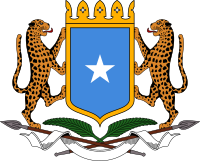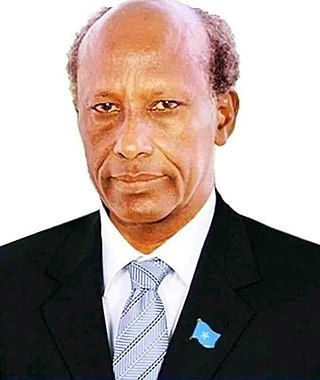
Mohamed Farrah Hasan Garad, popularly known as General Aidid or Aideed, was a Somali military officer and warlord.

Mohammed Siad Barre was a Somali military officer, politician and revolutionary who served as the third president of Somalia from 21 October 1969 to 26 January 1991.
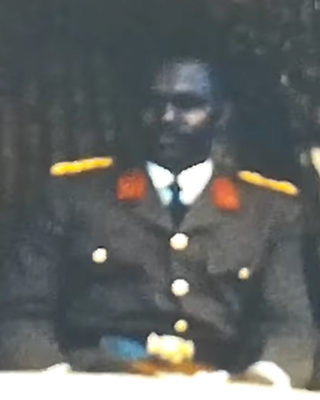
Michel Micombero was a Burundian military officer and politician who ruled the country as de facto military dictator for the decade between 1966 and 1976. He was the last Prime Minister of the Kingdom of Burundi from July to November 1966, and the first President of the country from November 1966 until his overthrow in 1976.

The Somali Democratic Republic was a socialist state in Somalia that existed from 1969 to 1991.
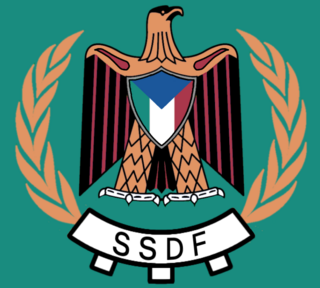
Somali Salvation Democratic Front (SSDF) (Somali: Jabhadda Diimuqraadiga Badbaadinta Soomaaliyeed), initially known as the Democratic Front for Salvation of Somalia, was a political and paramilitary umbrella organization in Somalia. Founded in 1978 by several army officers, it was the first of several opposition groups dedicated to ousting the authoritarian regime of Mohamed Siad Barre. With its power base mainly in the Majeerteen clan, SSDF played a significant role in the country's complex political landscape during the late 1970s and 2000s. And Succeeded by the establishment in 1998 of the autonomous Puntland state in northeastern Somalia.
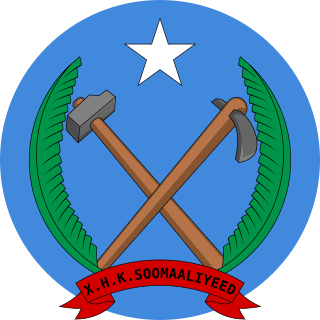
The Somali Revolutionary Socialist Party was the ruling party of the Somali Democratic Republic from 1976 to 1991.

The Ogaden War, also known as the Ethio-Somali War, was a military conflict fought between Somalia and Ethiopia from July 1977 to March 1978 over the sovereignty of Ogaden. Somalia's invasion of the region, precursor to the wider war, met with the Soviet Union's disapproval, leading the superpower to end its support for Somalia and to fully support Ethiopia instead.

Ahmed Mohamed Mohamoud "Silanyo" is a Somaliland politician who was President of Somaliland from 2010 to 2017. He is a long-time member of the government, having served as Minister of Commerce of the Somali Republic, and among other Cabinet positions. During the 1980s, he also served as the Chairman of the Somali National Movement.

Al-Itihaad al-Islamiya was an Islamist politico-military group in Somalia. Formed in 1983 through a merger of smaller Islamist groups, the organization was the most powerful Islamic movement in the country during the late 80s and early 90s. It also had the most widespread clan following of all the Islamist factions across the nation and professed the aim of creating a Somali Islamic state.
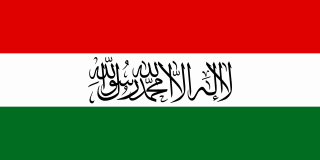
The Somali National Movement was one of the first and most important organized guerilla groups and Mujahideen groups that opposed the Siad Barre regime in the 1980s to the 1990s, as well as being the main anti-government faction during the Somaliland War of Independence. The organisation was founded in London, England, on April 6, 1981 by Hassan Isse Jama, Hassan Adan Wadadid, and Ahmed Mohamed Gulaid and other former Somali diplomats, who stated that initially the group's purpose was to overthrow the Siad Barre regime.
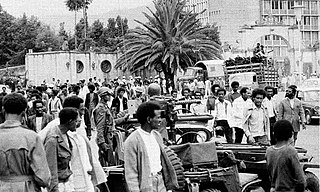
The Ethiopian Civil War was a civil war in Ethiopia and present-day Eritrea, fought between the Ethiopian military junta known as the Derg and Ethiopian-Eritrean anti-government rebels from 12 September 1974 to 28 May 1991.
The Somali Rebellion was the start of the Somali Civil War that began in the 1970s and resulted in the collapse of the Somali Democratic Republic in 1991. The rebellion effectively began in 1978 following a failed coup d’état and President Siad Barre began using his special forces, the "Red Berets", to attack clan-based dissident groups opposed to his regime. Backed by Ethiopia, the two earliest rebel factions, the Somali Salvation Democratic Front (SSDF) and the Somali National Movement (SNM) began attacks during the against government forces during the early 1980s.
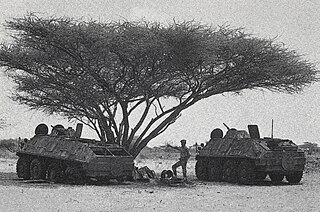
The 1982 Ethiopian–Somali Border War occurred from June to August 1982 when Ethiopia, sending a 10,000-man invasion force backed by warplanes and armored units, supported by thousands of Somali Salvation Democratic Front (SSDF) rebels, invaded central Somalia.

Ethiopia and the Soviet Union established diplomatic relations on April 21, 1943. Russia currently has an embassy in Addis Ababa, and Ethiopia has an embassy in Moscow. The Ethiopian ambassador to Russia is also accredited to Armenia, Azerbaijan, Belarus, Georgia, Kazakhstan, Kyrgyzstan, Moldova, Tajikistan, Turkmenistan, Ukraine, and Uzbekistan.

The Supreme Revolutionary Council was the governmental body that ruled Somalia from 1969 to 1976.
Anocracy, or semi-democracy, is a form of government that is loosely defined as part democracy and part dictatorship, or as a "regime that mixes democratic with autocratic features". Another definition classifies anocracy as "a regime that permits some means of participation through opposition group behavior but that has incomplete development of mechanisms to redress grievances." The term "semi-democratic" is reserved for stable regimes that combine democratic and authoritarian elements. Scholars distinguish anocracies from autocracies and democracies in their capability to maintain authority, political dynamics, and policy agendas. Anocratic regimes have democratic institutions that allow for nominal amounts of competition. Such regimes are particularly susceptible to outbreaks of armed conflict and unexpected or adverse changes in leadership.

Musa Bihi Abdi is a Somaliland politician and former military officer who has been President of Somaliland since December 2017. During the 1970s, he served as a pilot in the Somali Air Force under the Siad Barre administration. In 2010, Bihi was appointed the chairman of the ruling Kulmiye of Republic of Somaliland. In November 2015, Bihi was selected as the party's Presidential Candidate at the 5th annual central committee convention.

The Isaaq genocide, also known as the Hargeisa Holocaust, was the systematic, state-sponsored genocide of Isaaq civilians between 1987 and 1989 by the Somali Democratic Republic, under the dictatorship of Siad Barre, during the Somaliland War of Independence. The number of civilian deaths in this massacre is estimated to be between 50,000 and 100,000, according to various sources, whilst local reports estimate the total civilian deaths to be upwards of 200,000 Isaaq civilians. The genocide also included the levelling and complete destruction of the second and third largest cities in the Somali Republic, Hargeisa and Burao, respectively, and had caused up to 500,000 Somalis of the region, primarily of the Isaaq clan, to flee their land and cross the border to Hartasheikh in Ethiopia as refugees in what was described as "one of the fastest and largest forced movements of people recorded in Africa", which resulted in the creation of the world's largest refugee camp then (1988), with another 400,000 being displaced. The scale of destruction led to Hargeisa being known as the 'Dresden of Africa'. The killings happened during the Somali Civil War and have been referred to as a "forgotten genocide".

The 1969 Somali coup d'état was a bloodless military takeover of the Somali Republic on 21 October 1969, led by Somali National Army officers of the Supreme Revolutionary Council under General Siad Barre. After the assassination of President Abdirashid Shermarke in Las Anod, the Somali National Army under Barre's command stormed Mogadishu, seized key government buildings, and demanded the resignation of the country's leaders. The coup deposed acting President Sheikh Mukhtar Hussein and Prime Minister Mohammad Egal, ushering in a 21-year military rule under Barre and the establishment of an authoritarian government that lasted until 1991.

The Somaliland War of Independence was a rebellion waged by the Somali National Movement (SNM) against the ruling military junta in Somalia led by General Siad Barre lasting from its founding on 6 April 1981 and ended on 18 May 1991 when the SNM declared what was then northern Somalia independent as the Republic of Somaliland. The conflict served as the main theater of the larger Somali Rebellion that started in 1978. The conflict was in response to the harsh policies enacted by the Barre regime against the main clan family in Somaliland, the Isaaq, including a declaration of economic warfare on the clan-family. These harsh policies were put into effect shortly after the conclusion of the disastrous Ogaden War in 1978.
